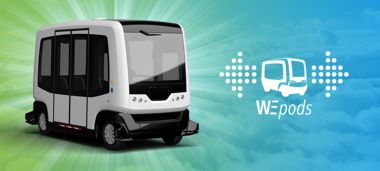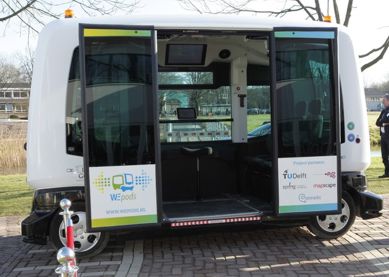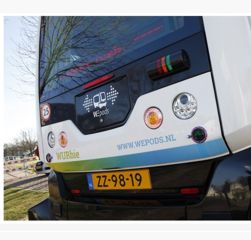| WEpod - First Driverless Passenger Service Arrives |
| Written by Harry Fairhead | |||
| Saturday, 13 February 2016 | |||
|
The era of the self driving vehicle really is upon us. It is not something for the distant future - but for Spring this year! An experiment in the Netherlands with a self-driving shuttle bus has passed another milestone towards autonomous vehicles. The WEpod is the first vehicles in the world without a steering wheel to be given license plates. Once it has finished its testing phase, the next phase of which is on a university campus of, the pair of automated electric six-passenger vehicles will provide a public service between the towns of Wageningen and Ede in the central Dutch province of Gelderland.
The WEpod site explains that pod is the commonly used term for a small automatic vehicle and the initials of two towns provide the prefix. It also refers to other self-propelled vehicle systems - the Rotterdam Rivium Shuttle, the Heathrow shuttles and the Masdar pods - that run on dedicated lanes, closed to other traffic. Although we've previously reported on public use of driverless golf carts, see Self Driving Vehicles Go Public, the setting in that case was a park otherwise occupied by pedestrians rather than public roads used by other vehicles. The WEpod site describes the breakthrough it is making (in English courtesy of Google Translate): The WEpods will go on public roads between other traffic. A control room will monitor the vehicle and the safety and initially a steward will guide the guests in the vehicle. The WEpods will initially on a fixed route drive, but the system can expand to more routes to and from other regions in the Netherlands. So the system can lead to a quality leap for public transport.
NVIDIA is one of the partners with Depft University of Technology in this project and a recent post on its blog explains how NVIDIA GPU's power the deep learning training purpose that enables the WEpods to: continuously assesses its environment and options at high rates, resulting in a dynamic system able to deal with real-world situations of mixed traffic quickly, reliably and safely. Dimitrios Kotiadis, senior researcher from TU Delft is quoted in the blog post as saying: “NVIDIA technology plays a crucial role in enabling us to meet our computational requirements. Each WEpod is in many ways a supercomputer on wheels.” The WEpod team hopes other cities will adopt WEpod technology once the trials are complete. The system will start operations in May.
More InformationWEpods WEpod Becomes First Driverless Car to Play in Traffic Related ArticlesSelf Driving Vehicles Go Public Google's Self Driving Cars - Not So Smart? Google's Self-Driving Cars Tackle Urban Traffic Hazards Google Self-Driving Car For Daily Commute Driverless Cars - More Than Just Google Driverless Cars Become Legal - The Implications Robot cars - provably uncrashable?
To be informed about new articles on I Programmer, sign up for our weekly newsletter, subscribe to the RSS feed, and follow us on Twitter, Facebook, Google+ or Linkedin.
Comments
or email your comment to: comments@i-programmer.info |
|||
| Last Updated ( Saturday, 13 February 2016 ) |




